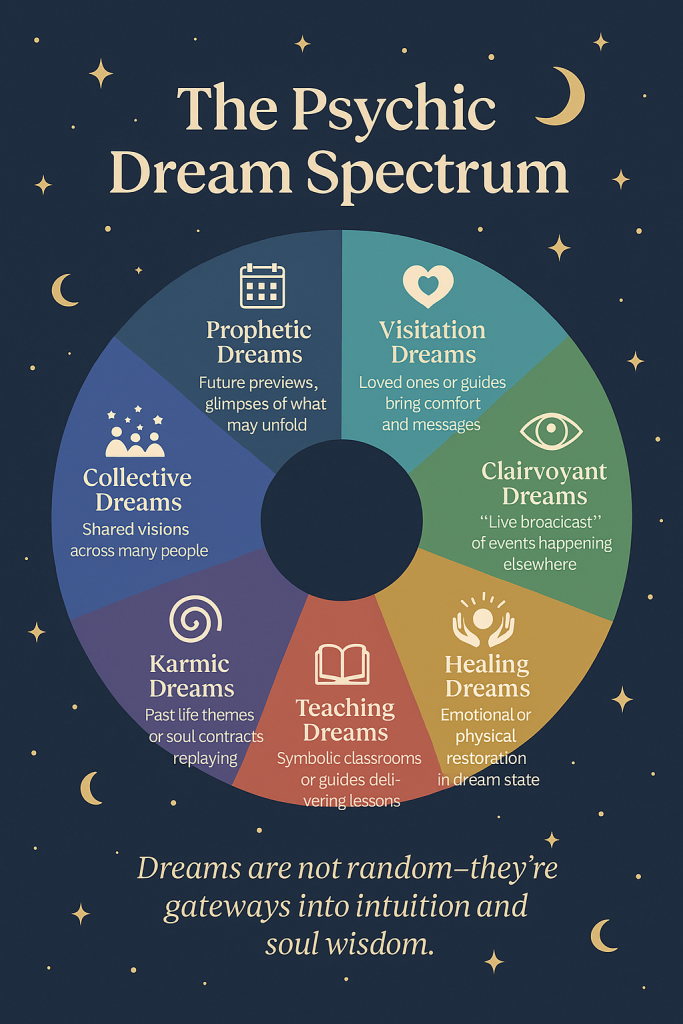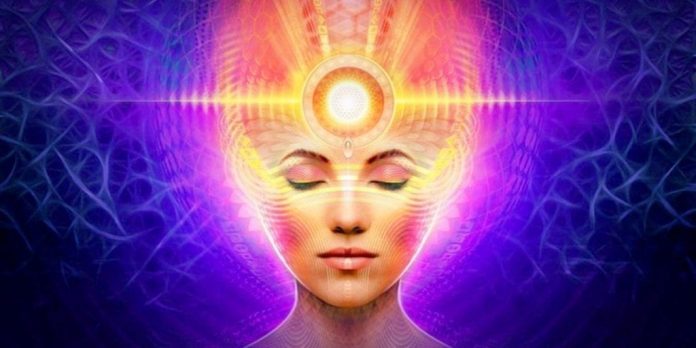Introduction: Why Psychic Dreams Matter More Than You Think
We’ve all had a dream that clung to us long after waking—the kind that feels heavier, stranger, or more vivid than the usual jumbled nonsense about running late to math class. Maybe you dreamed of a friend you hadn’t spoken to in years, only for them to call the next day. Maybe you dreamed of water flooding your house, and a week later your basement pipe burst. Or perhaps you dreamed of a deceased loved one, and their presence was so real it brought tears.
Most people shrug these off as coincidence or “just dreams.” But psychics know better. Dreams are not random reels of subconscious chaos—they’re portals into intuition, higher guidance, and energy beyond the five senses. Psychic dreams aren’t just fantasy; they’re your soul whispering through the cracks of sleep.
This article doesn’t just explain the well-known “three main types” of psychic dreams. We’re going further—exploring overlooked dream categories, real-world examples, and practical tools so you can recognize and work with them. Because once you learn to trust your dream life, you stop dismissing coincidence and start listening to your psychic self.
Regular Dreams vs. Psychic Dreams: How to Tell the Difference
Regular dreams are often like a messy attic—random objects, memories, and anxieties piled together. You dream of teeth falling out because you’re stressed, or of showing up to work in pajamas because you’re worried about performance. That’s your subconscious venting steam.
Psychic dreams, however, feel different. They’re sharper, stickier, and emotionally charged. They often come with sensory detail—colors too vivid, sounds too distinct, feelings too real to brush off. Many describe them as “more real than reality.”
One of my clients dreamed her brother called her crying, though she hadn’t heard from him in weeks. She woke up, shook it off, and went to work. That afternoon, he actually called—crying over a breakup. That wasn’t anxiety or random brain static. That was a psychic dream delivering information before it happened.
As Psychology Today notes, dreams can function as messages from deeper layers of consciousness. Psychics add another layer: sometimes those messages don’t come from your mind at all—they come from the energetic field that connects us all.
The Classic Three Types of Psychic Dreams (With Fresh Insight)
1. Prophetic Dreams
These are glimpses of the future. Some show specific events (like dreaming of a plane crash before one makes headlines), while others are symbolic previews (dreaming of a storm before a big fight). Think of them as “energy previews”—possible futures your subconscious picks up before they manifest.
Famous example: President Abraham Lincoln dreamed of his own assassination weeks before it happened, describing seeing mourners in the White House.
2. Visitation Dreams
In these, loved ones who have passed on—or sometimes guides—appear with comfort or messages. Unlike regular dreams, they’re vivid and deeply peaceful. You don’t wake up unsettled; you wake up reassured.
A client of mine once dreamed her grandmother gave her a blue scarf. She woke up crying with joy, only to discover that very scarf hidden in an old family chest weeks later. That’s not random—that’s contact.
3. Clairvoyant Dreams
These are “astral news reports.” You dream of something happening elsewhere, often in real time. For example, a woman dreamed of her friend’s car accident at the exact time it occurred across the city. Later, she confirmed the details matched perfectly.
These three types are often cited, but they’re not the whole story. Psychic dreams are like radio stations; the classic three are just the strongest channels. Let’s tune into the others.
Beyond the Three: Overlooked Psychic Dream Types

Healing Dreams
These are dreams where your spirit or body undergoes repair. People report feeling lighter after dreams in which they bathed in light, were operated on by unknown beings, or received energy healing. Ancient cultures often saw dreams as medicine—your body processing trauma and restoring balance.
Teaching Dreams
Ever dream of sitting in a classroom, reading strange books, or listening to a teacher who isn’t from your life? These are “soul school” dreams. Guides, ancestors, or even your higher self deliver lessons in symbolic form. One man dreamed repeatedly of climbing a ladder and was later told by his psychic that it symbolized his progress in spiritual growth.
Karmic Dreams
These revisit unresolved past-life or soul-contract lessons. You might dream of places you’ve never visited yet feel deeply familiar with, or relationships that play out with déjà vu. A woman I once read for dreamed she lived in medieval France. Later, in regression therapy, she discovered a past-life connection that explained her lifelong phobia of fire.
Collective Dreams
Perhaps the most mysterious, these occur when multiple people dream of the same symbol or event. After major world events, many report eerily similar dreams. Before natural disasters, empaths often dream of floods, fires, or falling skies. Carl Jung called this the “collective unconscious.” Psychics call it the collective energy field broadcasting a warning.
The Science-Spirit Bridge
Skeptics argue that dreams are nothing more than random neuron firings. Yet science itself admits we don’t fully understand them. VeryWellMind explains that dreams help with memory consolidation and problem-solving. But can they also reach beyond personal memory?
Psychics say yes. Many dreams serve a “dual purpose”—helping your brain file memories while your spirit receives messages. It’s not science or spirituality—it’s both.
Take the story of John, who dreamed of drowning. On the surface, it symbolized stress. But his psychic reading revealed water dreams often signal emotional overwhelm. Within a week, he had a breakthrough conversation with his therapist. His dream worked both neurologically and psychically.
How to Recognize a Psychic Dream
Wondering if your dream was psychic or just weird brain static? Use this checklist:
Emotional intensity: You wake with strong feelings that linger.
Vivid detail: Colors, sounds, and sensations feel hyper-real.
Symbol consistency: Recurring images, numbers, or settings appear over time.
Waking synchronicities: Something in real life soon echoes your dream.
As one psychic quipped, “If your dream sticks harder than last night’s garlic bread, it’s probably psychic.”
For instance, an empath dreamed of her best friend holding her stomach in pain. The next day, her friend revealed she’d been rushed to the ER with appendicitis. That’s not just dream debris—that’s psychic tuning.
Psychic Dreams in History and Culture
Cultures worldwide have honored dreams as messages. The Ancient Greeks consulted dream oracles at temples. Indigenous tribes used dream-sharing as community guidance. Even in modern times, countless reports exist of prophetic dreams preceding tragedies or breakthroughs.
Lincoln’s assassination dream is well known. But less known is Mark Twain’s prophetic dream of his brother’s death, which played out exactly as dreamed.
Even mainstream outlets like Oprah Daily encourage readers to live by intuition, noting that dreams are often our subconscious—or higher self—nudging us.
Practical Tools to Work with Psychic Dreams
If you want to harness your dream life, treat it like a sacred text.
Keep a dream journal: Record dreams immediately, even fragments. Patterns emerge only with time.
Bedtime intentions: Before sleep, say, “Show me what I need to know tonight.”
Use crystals: Amethyst and moonstone enhance intuitive dreaming. Place them near your pillow.
Discern fear vs. intuition: Nightmares may reflect anxiety, but psychic dreams leave a calm, knowing residue even when the imagery is intense.
One client journaled her recurring dream of a burning bridge. After three months, she realized it coincided with her wavering job situation. She later left that job and described the transition as “burning the bridge in the dream.” Her psychic reading confirmed it was guidance.
For more practical support, MindBodyGreen offers holistic practices to enhance intuitive dreaming.
Psychic Dreams as Part of a Spiritual Journey
Psychic dreams are not just quirky side stories. They’re milestones on your spiritual journey. Each one strengthens your trust in intuition. Each one reminds you that consciousness doesn’t stop when your eyes close.
A woman once told me she dreamed of standing on a shore, watching a boat sail away. Her psychic confirmed it symbolized the release of grief over her late husband. That dream wasn’t random—it was a ritual of closure her soul created.
Working with psychics can help interpret dream symbols, connect dots, and validate experiences. Dreams are proof of your psychic connection—an invisible string tugging at your awareness while you rest.
Conclusion: The Gift of Psychic Dreams
Psychic dreams are not accidents. They’re invitations—to heal, to learn, to prepare, to connect with the unseen. Whether prophetic, visitation, clairvoyant, or one of the overlooked types, they offer guidance if you’re willing to listen.
So the next time you wake up from a dream that feels “too real,” don’t brush it off. Write it down. Reflect. Share it with a psychic because your dream life may just be the truest conversation your soul is having with you.
Psychic Dreams FAQ
How do I know a dream was psychic and not just stress?
Psychic dreams linger with crisp detail and calm certainty. Stress dreams fade fast or feel jittery. If synchronicities show up after, that’s a tell.What’s the difference between prophetic and clairvoyant dreams?
Prophetic looks ahead (possible futures). Clairvoyant reports what’s happening elsewhere now. One is a preview; the other is a live feed.Do visitation dreams mean my loved one really visited?
Often, yes. They’re vivid, peaceful, and simple. You wake reassured, not confused. The message is clear, not chaotic.Can I influence whether I have psychic dreams?
Yes. Set a bedtime intention like, “Show me what I need to know.” Keep a journal beside the bed and speak it out loud.What symbols commonly show up in psychic dreams?
Water (emotions/clearing), bridges (transition), doors (opportunity), phones (messages), trains (timing). Track your personal symbol dictionary.Are nightmares ever psychic warnings?
Sometimes. Psychic warnings feel focused and purposeful, not random terror. You’ll sense direct guidance: change route, call someone, check in.How do I test if a dream was accurate?
Write it down, date it, and tag keywords. Watch for matches in days or weeks. Repeats raise the odds it’s psychic, not coincidence.Can two people share the same psychic dream?
Yes. That’s a collective dream. It often clusters around big events or shared soul groups and carries similar imagery across dreamers.What helps recall psychic dreams in the morning?
Before moving, replay the dream three times in your head, then jot bullet points. Avoid phones for five minutes to protect memory consolidation.Do crystals actually aid psychic dreaming?
Many find amethyst or moonstone helpful. Keep one by the pillow and cleanse weekly. A simple intention is more important than the stone.How do I reduce false positives from anxiety?
Do a body check. Anxiety spikes the chest and throat. Psychic signal feels steady, grounded, and matter-of-fact even if the content is intense.Can psychic dreams predict exact dates?
Occasionally, but timing is slippery. Dreams more reliably signal windows, patterns, or readiness than calendar-precise moments.How do lucid dreaming and psychic dreaming interact?
Lucidity lets you ask questions mid-dream. If you become lucid, request, “Show me only truth I can use kindly and safely.”What if a prophetic dream shows something I don’t want?
Remember: futures are probable, not fixed. Change choices, routes, or timing. Ask for an update dream after you act differently.Are teaching dreams from guides or just my brain studying?
Could be both. If a lesson repeats with the same “classroom” feel and leaves practical takeaways, treat it as guided instruction.Can health issues appear in psychic dreams?
Yes, often as symbolic scenes (leaks, rust, smoke). Use it as a prompt for self-care and professional checkups when appropriate.How can a psychic help with my dream?
They connect symbols to your energy field, confirm which parts are message vs. metaphor, and give action steps and timing cues.What’s the best nightly routine to invite helpful dreams?
Light dinner, low screens, two-minute breath, simple intention, journal ready, amethyst or moonstone near pillow, gratitude close.How do I avoid absorbing fear from intense dreams?
Close with a clearing: hand on heart, exhale long, say, “I release what isn’t mine. Keep only truth, love, and guidance.”When should I take a dream seriously enough to act?
When it repeats, arrives with calm clarity, or lines up with waking signs. Start with small, safe actions that honor the message.





For those of us deeply interested in the esoteric and the subconscious, this article serves as an excellent primer. The categorization of different types of psychic dreams is particularly useful for anyone looking to delve deeper into their own dream experiences. A fascinating read!
The distinction between precognitive and clairvoyant dreams is crucial. I appreciate how the article makes it clear that one deals with living beings while the other with non-living events.
I agree. Understanding these differences can help people interpret their dreams with more clarity and context.
Indeed, the distinction can also help in identifying whether a dream is significant or merely a product of one’s subconscious mind.
While it’s intriguing to consider the potential of psychic dreaming, there’s a lack of empirical evidence to support these claims. Dreams can be full of coincidences and our minds have a tendency to find patterns where none exist. Skepticism is warranted until more scientific backing is provided.
So, apparently, we can now predict future events and communicate telepathically through our dreams. I guess I’ll be waiting for my next dream to inform me about my next big life decision. This is sarcasm, of course. Interesting read, but let’s take it with a grain of salt.
The article provides an interesting exploration of the different types of psychic dreams. It’s fascinating how dreams can connect us to information or events that we are not consciously aware of.
This summary of precognitive, telepathic, and clairvoyant dreams makes it clear that the dream world is more complex and connected than we might think. I wonder how science can further investigate these phenomena.
It’s intriguing to consider the idea of telepathic dreams and how they link people emotionally. The mention of twins sharing dreams adds a unique perspective to this phenomenon.
The breakdown of the types of psychic dreams is very informative. It would be intriguing to learn more about how common these experiences are among people from different backgrounds.
This article opens up a compelling window into the enigmatic realm of dreams. The notions of precognitive, telepathic, and clairvoyant dreams are fascinating and suggest that our subconscious minds may possess untapped resources of knowledge. Truly remarkable!
Oh great, another article telling us that our dreams can predict the future. What’s next? Should I start consulting my cat for stock market tips? While the idea is amusing, it’s far-fetched, to say the least. Let’s stick to reality, shall we?
Comments are closed.